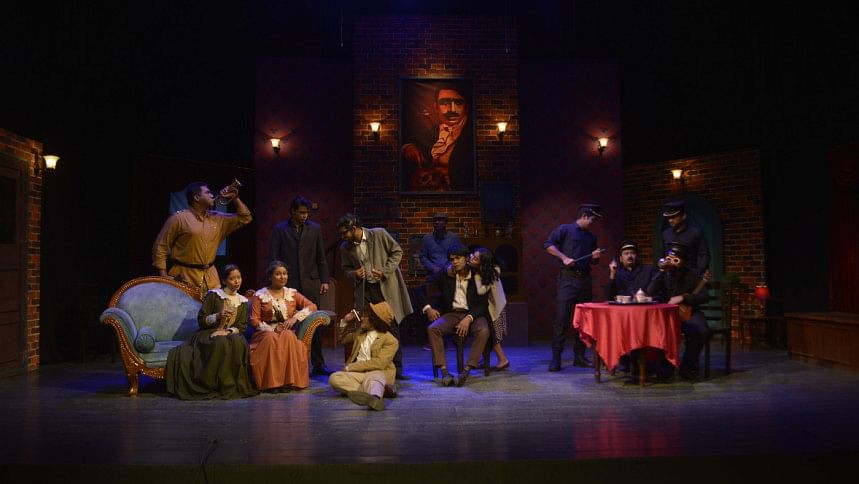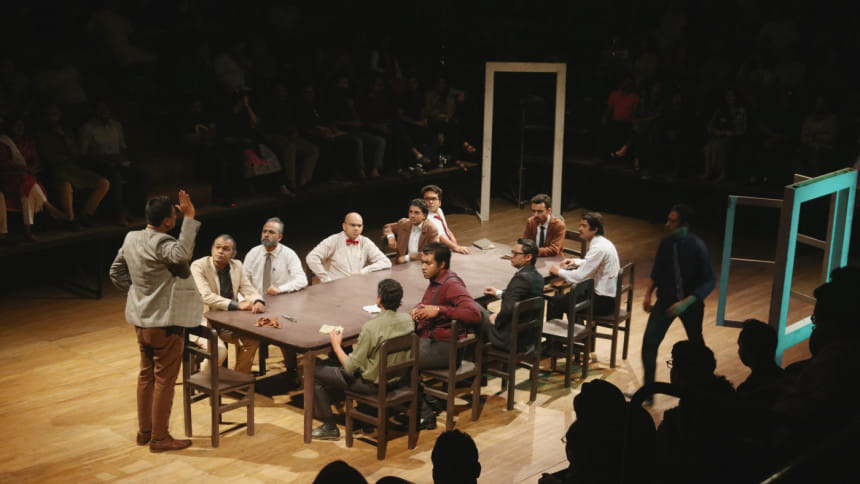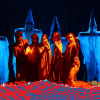Our theatre scene and its present challenges

Theatre has a rich history in Bangladesh. Like many other art forms, it combines social commentary and dialogue with skilful acting and narratives to reach audiences. With the advent of various entertainment platforms and given Bangladesh's limited approach to performative arts, theatre has progressed, but still has a long way to go to overcome multiple obstacles standing in its way.
Mohsina Akhter has been involved in the theatre scene since 2005 when she enrolled in Dhaka University's drama department. Currently, she works as a theatre director, actor, designer, and lecturer at Tagore University of Creative Arts (TUCA) and as adjunct faculty at the Department of Theatre and Performance Studies at the University of Dhaka.
"Intellectual and physical analysis portrayed in theatre teaches us to understand life. Character analysis and development allow us to get to know ourselves through the journey the characters undertake in every act," says Mohsina Akhter.

She further adds, "Unfortunately, until now, there is limited opportunity to choose theatre as a profession in Bangladesh. Everyone involved in theatre has to do something else to survive and this is an obstacle in its development."
Theatre is very distinct from television and other forms of media because there is no intermediary between the actors and the audience. There is no screen or middleman conveying the story to its audience allowing the viewers to relate with the plot, characters and setting directly and interpret the story. The ability of theatre to illustrate commonplace struggles, chores, and emotions to the audience is its most compelling feature and is one best resonated through audience interaction and reaction.
While there are many challenges within the business, the audience sheds hope. In Mohsina's opinion, "The new generation is eager to see theatre differently." To her, this is one of the more positive things in the scene currently which assures her that a solution to the existing challenges will emerge.
She further elaborates, "While this generation is addicted to social media and their attention span is very short, I do not think it should affect theatre. Watching theatre is a practice and there are many countries where this practice is prevalent."
One of the obstacles standing in the way of theatre expansion is the availability of halls. Mohsina states, "Currently, Bangladesh's theatre is in a very critical condition. We don't have enough stages or money. Teams are trying to make plays with their own pocket money. Ticket prices have to be kept very low; so, it does not compensate for the production expenses. Furthermore, there is also a lack of professional skills."
While Mohsina's view on theatre as a full-time career reflects a specific group of people trying to pave their path, theatre has gradually gained more mainstream attention, with more people actively looking to theatre as a full-time career and audiences being more enthused to watch these performances.

In 2017, Mahjabeen Chowdhury and M Arifur Rahman founded Open Space Theatre, based on their combined experience of two decades in the theatre field. Since then, they have staged more than 74 performances in front of 20,000 plus spectators, created multiple productions, and conducted numerous acting workshops to develop new actors to keep the theatre sector booming as a profession and to enable others to build a career in this field.
Mahjabeen says, "Open Space Theatre creates performances which are entertaining, organic and vivid to help the audience take that essential break and expand their overall perspective on life aspects."
Since Open Space Theatre began working there have been more people, more performances, more occasions, and more conversations regarding theatre.
"Open Space Theatre has created an entire generation of audiences who have high standards regarding theatre. Other theatre practitioners who used to claim earlier that theatre audiences consist of only four to five thousand people have been proven wrong. Audiences have now become accustomed to purchasing our tickets even a month ahead of shows," Mahjabeen explains. "Before we came into the picture, they were comfortable with empty halls and blaming the audience for not appreciating theatre. Now, at least they are attempting to figure out ways to survive and make efforts to be relevant."
"The abilities required to create a theatre group, provide leadership, and establish the team's financial stability require years of practice. It is a profession for those with unwavering passion and exceptional ability. This is not a place where everyone will succeed," Mahjabeen elaborates, while talking about how far Open Space Theatre established itself as the first and only professional theatre troupe in Dhaka.
Given the challenges and the effort required to make theatre one's singular career, Open Space has created a platform in which individuals can invest their undivided time and energy, passion and interest, and hone the artform. Due to this effort, over the years, the audience has now become attracted to theatre performances and find relevance through their mesmerising acting and storytelling.
Mahjabeen goes further to advise and encourage those who are interested in theatre, to first invest their time in learning the craft.
Mahjabeen goes on to give a more argumentative perspective when talking about theatre halls, saying, "Theatre Hall rents are heavily subsidised by our government, but the hall allocation process is somewhat biased and not based on criteria such as production quality or audience demand."
Despite having the immense support of audiences and a group of people dedicated to production, Mahjabeen goes on to point out that there is still a lack of substantial contribution from the journalists or media in diligently promoting theatre.
A career in theatre boils down to one's passion and dedication to the art. "Theatre is becoming more relevant day by day. Its reach is growing and its importance is felt by those who experience it. Whatever the future brings, I am hopeful that theatre will keep our lives interesting," says Mahjabeen optimistically.
Overall, there are challenges which exist in the theatre field. However, with dedication, passion and hard work, it is possible to build on this artform and mould it into a career with fruitful outcomes for everyone involved.
Photo: Open Space Theatre

 For all latest news, follow The Daily Star's Google News channel.
For all latest news, follow The Daily Star's Google News channel. 








Comments